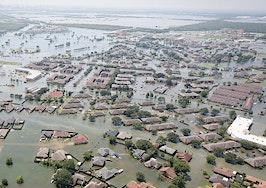A Harvard study that quantified the impact of climate change on property values and gentrification made a splash when it was released last spring, and this week’s heat wave has touched a fresh spark of interest in the findings.
The study, “Climate gentrification: from theory to empiricism in Miami-Dade County, Florida,” was published in the journal Environmental Research Letters under the authorship of Harvard professors Jesse Keenan, Thomas Hill and Anurag Gumber. It analyzed 800,000 properties, using data from the Miami-Dade County Property Appraiser’s Office, which included “property type, unit count, lot and building size, property and building values, year-built, bed and bath counts, market and property tax assessment values, exemptions, owner name, address, zoning, and the last three transactions.”
From there, the researchers zeroed-in on 107,984 properties and found their estimate values going back to 1971. The study also cross-referenced the property values with the respective property elevation levels, finding that since the year 2000, properties located in areas that were 0-1 meters above sea level experienced slower and less appreciation than those located at higher elevations.

“Climate gentrification: from theory to empiricism in Miami-Dade County, Florida” Environmental Research Letters, by Jesse M Keenan, Thomas Hill and Anurag Gumber
In a phone conversation with Inman, Professor Keenan emphasized the significance of the new study.
“This is the first peer-reviewed, published evidence of the existence of a climate change signal in real estate, and this is the first published evidence that the business of climate change has already impacted the value of people’s homes,” he said.
Other studies have recently shown seaside communities around the world, including Miami and other coastal metropolises New York and Shanghai, are at risk of rising seas due to ice-melt from a warming Earth and that real estate values and entire economic regions are likely to take big value hits.
In a nutshell, the new Harvard study provides a fact-based grounding for the concept of “climate gentrification,” a phenomenon that seems to make common sense.
In a region experiencing climate impacts like sea-level rise, people will pay more to live to areas of higher elevation. The corollary of the so-named “Elevation Hypothesis” is not necessarily that lower-elevation homes will lose value. In an area where overall property values are rising, it may simply mean that lower-elevation properties do not rise in value as quickly.
The problem is that common sense is not a particularly solid foundation for adjusting insurance rates. The Harvard study provided the missing link, by validating both the Elevation Hypothesis and its corollary:
“The findings … suggest the potential existence of consumer preferences that are based, in part, on perceptions of flood risk and/or observations of flooding,” the professors write. “These preferences and perceptions are anticipated to be amplified by climate change in a manner that reinforces the proposition that climate change impacts will affect the marketability and valuation of property with varying degrees of environmental exposure and resilience functionality.”
The impact of environmental factors on property values is not a new phenomenon. Keenan expects the study, and others like it, to add to the body of knowledge already employed by risk analysts.
“We already have quantified the impacts of drought, slope destabilization and wildfires,” he said. “Now climate change can be quantified in a similar way. Climate change is a risk that is now being understood by mortgage and insurance providers, and it will impact public bonds, getting a mortgage and even car insurance.”
As for the risk itself, Keenan emphasized that climate change is on a scale that makes other risks pale by comparison.
“Brownfields are a good example,” he explained, referring to vacant industrial sites that require remediation. “Environmental exposure has played a role in shaping real estate patterns, and we all understand that. But the impacts from climate change make brownfields look infinitesimal by comparison.”
Keenan also offered some food for thought to people who do not accept the evidence that human activity is the root cause of climate change.
“Your belief in something is inconsequential to the fact that it is already impacting you,” he said. “Climate change as a pathology is an apt metaphor. You can choose not to believe in cancer, but it can still kill you.”
The new study underscored the consensus on climate change: it’s here, it’s happening, and it’s already having an impact on property values.












